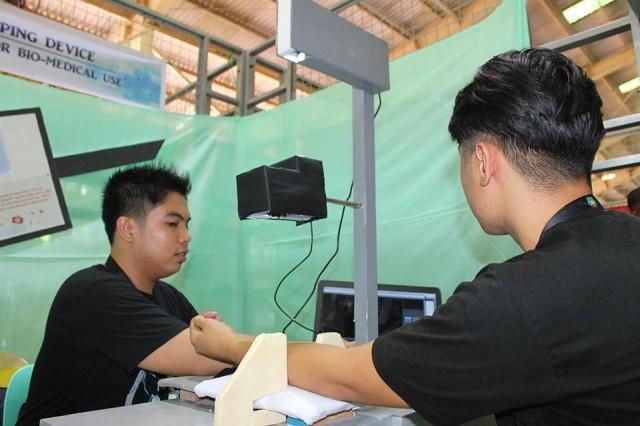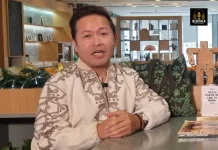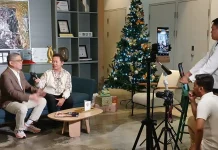
College students from Don Honorio Ventura State University in Bacolor, Pampanga have created a simple and affordable electronic vein mapping device that can assist medical practitioners to locate veins to lessen mistakes in getting blood from patients.
The invention caught the attention of the Department of Science and Technology (DOST) which awarded the student project a Runner-up Prize in the Student Creative Research Category of the recently-concluded 2019 DOST – Central Luzon’s Regional Invention Contest and Exhibit (DOST-RICE).
The project won a cash prize of Php10,000 and DOST’s support for an Intellectual Property Office patent.
The students that worked on the creation of the invention are Mary Nichole G. Dalay, Cristene Kiarra C. Flores, Jake Lester D. Gonzales, Anthony A. Tio, Shayne G. Tungol and Allain Christian M. Villaluz. The team adviser was Engr. Karl Angel M. Gamboa.
Secretary Fortunato dela Pena, described the invention as an “interesting find at the DOST RICE competition”.
Attached to a laptop, the device has an infrared light to locate the veins, CMOS camera to scan the image, and a Vein Mapper App (MATHLAB-code) to process and enhance the image. It then uses visible light to project back to the skin with a mini-projector.
Nichole Dalay, a member of the team, explained that it is the first locally made vein mapping device in the Philippines and it is very affordable. Hundreds of DOST-RICE participants and visitors who tried the medical device got excited as they saw their veins illuminated in real-time.
Cost-effective
The group said one of the main advantages of their vein mapping device is its affordability. Their device only costs Php5,000 while medical devices available in the market today costs around Php200,000. With the low price, the government can afford to provide public hospitals with such devices.
Benefits the Patient and Med Practitioner
The Vein Mapping Device helps medical practitioners perform their duties properly as it improves the process in collecting blood from patients. It is safer and avoids unnecessary pain and infection on patients as it lowers the risk of mistakes in the procedure.
“Although professionals na ‘yung gumagawa, hindi po nila maiwasan magkakamali through the manual procedures because wala pong definite na procedure kung papaano mag-pop ng veins. Mga traditional techniques lang po ‘yung ginagamit,” said Shayne Tungol, one of the team members.
In their study, the team quoted a 2016 World Health Organization (WHO) report saying that unsuccessful venipuncture operations can increase the risk of infection by 100 percent.
Limitations
Although the team’s new device can help lower unsuccessful venipuncture rates in patients, it has some limitations.
“This project is only effective in a given range of operations, and in other cases such as burnt skin, micro-pigmentation, it does not give the output this research is aiming,”
They added that the device was still a prototype, and it had to be patented at the Intellectual Property Office of the Philippines.
Asked about the future of the invention, Dalay said that the team is planning to upgrade their device by using different materials, sophisticated coding, and improving on its portability.
“I hope everyone will know the importance of research po, especially the government. I hope the government supports the funding for researches. Especially para sa public benefit naman siya,” Tungol said.
Philippine university and college students have created science projects to aid the medical industry, among them, University of Santo Tomas’s Electronics Engineering student Jay Patrick Nieles who developed a brain-computer for patients with Locked-In Syndrome and University of the Philippines Manila Biology student Christian Luke Badua who researched into the use of probiotics for colon cancer treatment. The young Filipino scientists received the 2019 BPI DoST Science Awards.
SEND congratulations to the Honorians of Pampanga for their new invention!
Like, Follow, Subscribe to GoodNewsPilipinas.com Facebook, Twitter, Instagram, Good News Pilipinas! TV on YouTube, new story notifications and e-mail newsletters for updates on more Filipino Pride stories.










